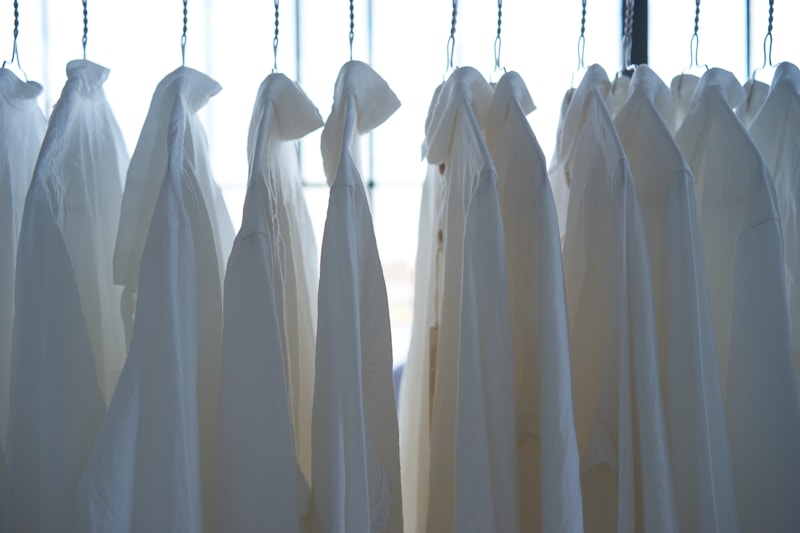Couture Fabric Usage in Custom Wedding Gowns: Elevate Your Dream Dress
Couture Fabric Usage in Custom Wedding Gowns: Elevate Your Dream Dress
Introduction to Couture Fabrics in Custom Wedding Gowns
When it comes to creating the perfect wedding gown, the choice of fabric can dramatically influence the overall design, feel, and aesthetic of the dress. Couture fabric usage in custom wedding gowns not only emphasizes elegance but also provides a unique touch that sets your gown apart. In this article, we will explore the different types of couture fabrics, their applications in wedding gown design, and why opting for custom couture can enhance your special day.
Understanding Couture Fabrics
Couture fabrics refer to high-quality materials that are often handmade and tailored specifically for high fashion garments. These fabrics exhibit characteristics such as durability, luxuriousness, and the ability to hold intricate designs. Let’s discuss some popular types of couture fabrics used in custom wedding gowns.
| Type of Fabric | Characteristics | Common Uses |
| Satin | Soft, glossy finish, medium weight | Flowy skirts, structured bodices |
| Lace | Delicate, intricate patterns, sheer | Overlay, sleeves, details |
| Organza | Lightweight, crisp, transparent | A-line dresses, overlays, embellishments |
| Silk Taffeta | Crips, lustrous, holds shape | Ball gowns, structured trains |
| Chiffon | Semi-transparent, flowing, lightweight | Layering, draping, soft silhouettes |
Why Choose Couture Fabrics for Wedding Gowns?
Choosing the right fabric can make or break your wedding gown. Here are some benefits of using couture fabrics:
- Quality: Couture fabrics are often sourced from high-end suppliers who focus on quality over quantity, ensuring that your gown is crafted from the best materials available.
- Personalization: Custom wedding gowns allow for the use of unique fabrics, giving couples the freedom to reflect their own styles and personalities.
- Comfort: Premium fabrics often feature better drape and fit, making them more comfortable to wear throughout your wedding day.
- One-of-a-Kind Design: Couture fabrics enable unique designs and intricate details, allowing your dress to stand out on your special day.

Designing Your Custom Wedding Gown with Couture Fabrics
When designing a custom wedding gown, there are several aspects to consider, especially when it comes to fabric. Here are some tips on how to effectively use couture fabrics:
1. Choose Your Silhouette Wisely
Your gown's silhouette should complement the fabric you choose. For instance, flowing fabrics like chiffon are perfect for A-line gowns, while structured fabrics such as silk taffeta work wonderfully for ball gowns.
2. Consider the Season
The season of your wedding plays a big role in fabric selection. Lightweight fabrics like organza or chiffon are ideal for summer weddings, while heavier fabrics such as satin and silk taffeta are suitable for winter celebrations.
3. Collaborate with a Designer
Working with a skilled designer can greatly enhance your gown's overall design. They can provide insights on which fabrics work best for your body type, style, and theme, ensuring that every detail aligns perfectly.
Frequently Asked Questions
What is the difference between couture and ready-to-wear wedding gowns?
Couture gowns are custom-made for an individual and typically use higher-quality materials compared to ready-to-wear gowns, which are made in standard sizes and fabrics.
How long does it take to create a custom wedding gown?
The process can take anywhere from three to six months, depending on the designer and complexity of the gown. It’s important to schedule consultations and fittings well in advance of your wedding date.
Are couture gowns more expensive than off-the-rack dresses?
Yes, couture gowns typically come with a higher price tag due to the labor-intensive process involved in custom design, as well as the quality fabrics used.
Conclusion
Opting for a custom wedding gown crafted from couture fabrics allows brides to express their individuality and style in an unforgettable way. With options ranging from plush silks to delicate laces, the possibilities are endless. However, it is crucial to choose a reputable designer who understands the unique characteristics of various fabrics, as well as the specific needs and desires of the bride.
As you approach your wedding day, keep in mind the importance of comfort, seasonality, and personalization when selecting your couture fabric. Remember, your wedding gown is not just a dress; it is a symbol of love, commitment, and a once-in-a-lifetime experience. Prioritize your preferences and work closely with your designer to create the gown of your dreams, ensuring that your wedding day is as magical as you envisioned.
In summary, the choice of couture fabric in custom wedding gowns is integral to achieving a beautiful, personalized garment that mirrors the love and joy of your significant day. Don’t hesitate to explore your options and take the necessary steps towards creating your perfect wedding gown.
